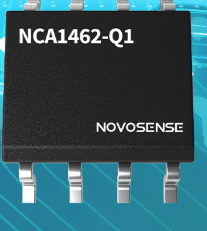For faster, more reliable in-vehicle networking with a high-performance CAN transceiver engineered for advanced automotive and industrial systems, it ensures robust performance across demanding CAN FD and Classical CAN networks.

NOVOSENSE Microelectronics has announced the release of the NCA1462-Q1, a next-generation high-speed CAN transceiver designed to deliver superior performance and reliability in modern automotive and industrial communication systems. This advanced transceiver operates in both Normal and Standby modes and features a versatile VIO supply pin, supporting seamless integration with microcontrollers operating at 1.8V, 3.3V, and 5V. Fully compliant with the ISO 11898-2:2016 standard, it also meets the CiA 601-4 Signal Improvement Capability (SIC) specification, ensuring optimal signal integrity and full interoperability with both Classical CAN and CAN FD transceivers.
It has good signal quality, drastically reducing network ringing and enabling reliable CAN FD communication at 5 Mbit/s even in complex, large-scale topologies. Its precise bit timing symmetry further extends CAN FD capability up to 8 Mbit/s, making it an ideal drop-in replacement for existing high-speed transceivers like the NCA1042. Designed with automotive-grade robustness, it offers bus fault protection from -58V to +58V and supports a wide bus common-mode voltage range of -30V to +30V.
The key features are:
- TXD dominant timeout protection
- Standby mode bus dominant timeout
- Ultra-low current standby mode with wake-up
- Built-in over-temperature protection
- Supports data rates up to 8 Mbps
The device features critical safety and power-saving functions, including TXD dominant timeout, standby mode bus dominant timeout, and an ultra-low current standby mode with wake-up capability. It is protected against over-temperature conditions and operates reliably across a broad temperature range from -40°C to 125°C. Qualified to AEC-Q100 Grade 1 standards and compliant with RoHS and REACH directives, it is engineered for high-reliability environments.
Ideal for applications such as automotive gateways, body control modules, infotainment systems, and Advanced Driver Assistance Systems (ADAS), it also supports a range of CAN protocols including CANopen, DeviceNet, NMEA2000, ARNIC825, ISO11783, and CANaerospace. Whether managing high-speed networks or operating on low-data-rate CAN systems down to 10 kbps, it ensures robust, efficient communication for today’s demanding electronic systems.
For more information, click here.






